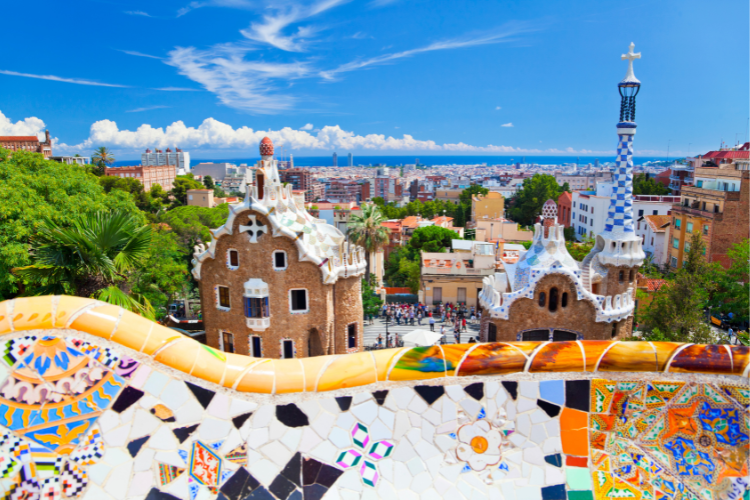Last Updated on November 8, 2024 by Laila Oliveira
With so many visas for Spain, which one should an expat choose? Well, it depends entirely on what your intent is. Figuring out which visa is appropriate is a common issue for many expats relocating to any new country, including Spain. But that’s why Viv Europe is here to clarify that for you!

We’ll explore the different types of visas available in Spain and the documents you’ll need for each. Certain requirements stay the same, for example, proving you have a means of subsistence. But other things like having accommodation or not can differ according to the visa.
We also understand that navigating the visa process can be daunting, especially if it is your first time. Sit back and relax as we give you extra tips and recommendations for visa assistance in Spain. Let’s get right in!
Residence Permit in Spain
Immigrating to a new country is one of those events in life that can be satisfying but also comes with a lot of paperwork. One thing you need to consider before packing your bags and leaving your home country is the residence permit.
This is particularly true if you intend to immigrate to Spain permanently. But what is a residence permit? This is an authorization the Spanish government gives non-EU expats to live in the country for more than 90 days.
For short-stay visits such as tourism, you won’t need a residency permit; rather, you need a short-stay or Schengen visa. The short-stay alternative only grants you a stay for a maximum of 90 days in Spain.
Of course, a residence permit comes with its fair share of perks you can take advantage of, for instance, access to healthcare and employment opportunities. Getting a residence permit is an asset if you want to relocate to Spain permanently.
Obtaining a visa
Once you’ve determined the appropriate visa for your needs, the next step is to submit your application form. Make sure to select the correct form based on the intended duration of your stay: either the short-stay or long-stay visa application form.
Provide all required information accurately on the form, and remember to sign it right after printing. Schedule an appointment, which can typically be done via phone, online, or in person, depending on the consulate or embassy’s procedures in your home country. While awaiting your interview, gather all the necessary documents, which we’ll discuss later.
During your interview, ensure you have the completed application form and all required documents to expedite the process. Finally, pay your application fees and await the outcome of the process.
Obtaining a Residence Permit
The residence permit in Spain is divided into two; temporary residence and long-term or permanent residence. Temporary residence will grant you the legal right to stay in Spain for over 90 days but less than five years.
You will likely apply for this type of residence since the permanent alternative will require you to have this one first. Long-term or permanent residence grants immigrants indefinite legal stay in the country.
However, you must have lived in Spain for five years to qualify for this residence permit. Each type of residence permit is available regardless of your reasons for moving to Spain.
Here is a list of documents you must present when applying for temporary residence in Spain:
- Valid Passport
- Proof of sufficient financial means to support yourself in Spain
- Any other documentation required for your specific situation, e.g., work contract, proof of enrollment in a Spanish educational program, etc.
To initiate the application process for permanent residency in Spain, you must provide specific documentation. These documents include:
- Proof of payment for the relevant fees.
- A fully completed EX-11 form.
- A copy of your existing residency card.
- A copy of your original Passport.
- A police certificate verifying your criminal record.
- Copies of your tax returns and employment payroll records.
Be sure to start the application for your permanent residence two months before the expiration of your temporary residence. The application process is often slow, thanks to bureaucracy.
All about residence visas to Spain
Residence visas to Spain are essential if you plan to relocate for an extended period. These visas grant non-EU citizens the legal right to reside in Spain, making them a crucial step in the immigration process. There are various types of residence visas available, each catering to different circumstances and reasons for moving to Spain.
Documents you must present
Gathering all the necessary documents is one of the crucial steps when planning to apply for visas in Spain. Speaking of documents, there are two categories for all visas to Spain.
- The standard documents for every type of visa
- Documents specific to the type of visa you are applying for.
Here is a list of the standard documents you will need to present for all visas for Spain.
- Visa Application Form.
- Two biometric photos according to Spain’s requirements.
- Your Passport.
- Copies of Passport pages with info
- Flight reservation.
- Proof of accommodation.
- Medical Insurance.
- Medical Certificate.
- Proof of means of subsistence
Proof of means of subsistence
Showing proof of sufficient financial means applies to all visas for Spain. This is a common precaution for most countries, including Spain, ensuring you can financially support yourself.
The Spanish government does this to ensure that you don’t become a burden on the welfare system.
Per the European Commission guidelines, you must have an amount equivalent to 90% of the gross national minimum wage for a period of up to 10 days.
This translates to €573.23, which reflects the required sum for this duration. If your intended stay in Spain is shorter than 10 days, you should budget approximately €57.32 per day.
For trips lasting longer than 10 days, you must plan for around €70.77 per day. Remember, you must show proof of having the funds mentioned during the visa application process. You can prove that you have the necessary funds by presenting the following:
- Bank Statements: Provide a recent bank statement showing a stable income of sufficient funds to cover your stay in Spain. These statements should cover a specified period, usually the last three to six months.
- Sponsorship Letter: If you are being financially sponsored, a sponsorship letter detailing the sponsor’s financial resources and willingness to support your stay may be required.
- Employment Contract: If you are employed, submitting an employment contract stating your position, salary, and duration of employment can serve as proof of financial stability.
- Pension Statements: Retirees or individuals receiving pension payments can submit pension statements or letters from pension providers as evidence of a steady income stream.
Other documents that may also serve as proof of means of subsistence are;
- Rental income, if you have any properties that you rent out.
- Income from your business if you are self-employed.
- Scholarship confirmation that shows the amount you will receive for students.
Proof of accommodation
Another prerequisite for applying for a visa to Spain is providing evidence to the Spanish authorities regarding your accommodation arrangements while in the country.
The following documents can serve as proof of accommodation:
- Hotel Reservation: Present a booking confirmation that includes your name, the duration of your stay, and the hotel details.
- Invitation Letter: If you plan to stay with friends or family residing in Spain, provide a letter of invitation from your host in Spain. Be sure to include their contact information, address, and intended duration of your stay. Only original colored copies are acceptable.
- Rental Agreement: If you intend to rent a property during your stay in Spain, you must provide evidence of the rental arrangement. This includes presenting the rental agreement with the property owner. This agreement should specify the location, address, and owner’s details of the rented premises.

International travel insurance
After the pandemic, it has become a requirement for almost every country for visitors to have travel insurance when traveling, and Spain is no different. The type of insurance you will need will depend on the duration of your stay in Spain.
Your health insurance must cover medical costs of up to €30,000 throughout your visit to Spain. What’s more, the insurance coverage should be valid across the entire EU for the entirety of your stay. The minimum number of days covered by your insurance is seven. This doesn’t change if you are visiting for only two days.
However, if you are applying for a long-stay visa, you must get medical insurance from a provider in Spain. Remember, while Spain boasts a commendable healthcare system, the expenses can be overwhelming for foreigners. You need health insurance to cover any unforeseen ailments or accidents.
Let’s Move to Europe
With Viv Europe your plans for Europe will come to a reality
Business Visa to Spain
If you intend to travel to Spain strictly for business purposes, then you will be a good candidate for the business visas for Spain. This particular type of visa is typically issued to entrepreneurs, investors, company representatives, and employees traveling for work purposes.
This visa grants you legal stay in the country for up to 90 days. While in the country, you can attend and engage in unpaid business activities like meetings, conferences, negotiations, or exploring investment opportunities.
Apart from the standard documents you need to apply for all visas for Spain, here are others that are specific to this type of visa.
- Invitation letter from a Spanish company or organization detailing the purpose and duration of the visit.
- Work certificate indicating your employment status, position, salary, and the date you started working for the company.
It is worth emphasizing that this visa is strictly for unpaid business activities. If you want to work or earn money in Spain, you must apply for a different type of visa.
Working Visa to Spain
Since the business visa won’t let you work in Spain, a good alternative for working-age expats is the working visa. Unlike the business visa, this option allows you to stay longer in Spain.
This visa is granted to individuals who have secured a job offer from a Spanish employer or who plan to start a business in Spain. There are two types of work visas for Spain: the employment visa and the self-employment visa.
A work visa permits you to be employed by a company, institution, or organization in Spain. The main types of visas under this specific category include:
- Spain Au Pair Visas
- Spain Working Holiday Visas
- Spain Entrepreneur Visas.
On the other hand, a self-employment visa is intended for individuals who wish to:
- Start a new company in Spain
- Invest in an existing company
- Engage in remote work while residing in Spain.
In addition to the standard documentation required for all visa applications, you must also provide proof of work authorization, professional qualifications, and an employment contract.
Retirement Visa to Spain
Spain is a great destination for expats who want to live their golden years in a pleasant climate and beautiful culture. A retirement visa allows retirees to become residents of Spain without necessarily engaging in active employment.
Regrettably, there isn’t a visa specifically designated for retirement in Spain. While that is true, there are different visas you can use as an expat to retire in Spain. The two most popular options among retirees include the golden visa and the Non-Lucrative Visa.
Non-Lucrative Residence Visa
The Non-Lucrative Residence Visa is one option you could use to move and retire to Spain. Just from the name, you can already tell that you cannot make any meaningful employment from it.
That said, you must show proof that you have sufficient funds to care for yourself and whoever is dependent on you. The minimum required amount is 400% of Spain’s Public Multiple Effects Income Indicator (IPREM), which is approximately 27,792.96 euros. You’ll also need to add 100% (approximately 6,948.24 euros) of the IPREM for each family member you intend to include.
Lastly, immediately after you get to Spain, you must apply for a residence permit specifically for the Non-Lucrative residence visa.
Spain Golden Visa
The Spanish Golden Visa is a residency-by-investment program that grants non-EU citizens and their families the right to live and work in Spain. Individuals applying for a Golden Visa will receive a residency permit enabling them to reside in Spain.
Typically, the Golden Visa is sought as a means to secure permanent residency in the country. Unlike other types of visas for Spain, the Golden visa is quite capital-intensive because it is designed for investors. Here are some of the qualifying investments for the Spanish Golden Visa Program.
- Real Estate Investment: Purchasing property in Spain with a minimum value of €500,000.
- Capital Investment: Investing at least €1 million in Spanish stocks, bonds, investment funds, bank deposits, or €2 million in Spanish public debt securities.
- Business Investment: Starting a business venture in Spain that creates job opportunities, contributes to scientific or technological innovation, or has a significant economic impact.
One of the main advantages of the Spanish Golden Visa is its freedom of movement within the Schengen Area. It allows visa holders to travel to other European countries without the need for additional visas.

Why are people moving to Spain?
Expats are increasingly relocating to Spain, and the reasons are clear. The country’s appealing climate, stunning landscapes, and overall high standard of living are key attractions for expatriates, especially digital nomads and retirees.
Spain’s appeal goes beyond its sunny coastlines and scenic views. For many people, moving to Spain provides a distinct mix of cultural integration, lifestyle quality, and economic potential.
This is also one of the main draws behind American expats’ interest in visas for Spain from the USA.
Per the General Council of Notaries in Spain, there was a 13% increase in Americans relocating to Spain from 2019 to 2021. Overall, Spain’s allure lies in its ability to offer a fulfilling and diverse experience for expats seeking new adventures and opportunities.
Do you need Visa assistance to Spain?
Navigating the visa process for Spain can be complex and daunting. Whether you’re considering a short stay, long-term relocation, or investment opportunity, understanding the various visa options available in Spain is crucial.
From tourist visas to residency permits and investor visas, each category has specific requirements and procedures that must be followed. Viv Europe can help simplify the process for you and ensure that you meet all the necessary criteria.
Whether you’re seeking a Golden Visa, a Non-Lucrative Visa, or even visas for Spain from the USA, professional assistance can help you navigate the process. Don’t know where to start and need some clarity?
Book a consultation with our experts, and let’s get started on your dream now! We have helped many people realize their immigration dreams to Portugal and Spain. Consider joining our Facebook Group – All About Portugal For Expats, and chat with a few. See you soon!





